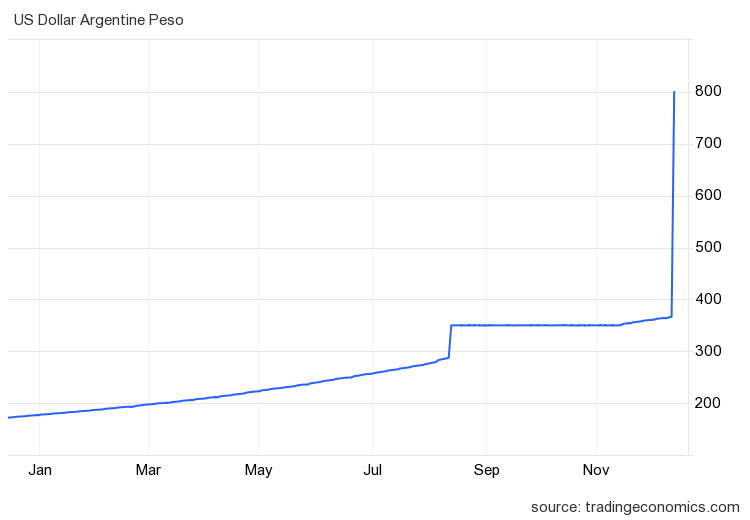Zinger Key Points
- Milei's economic reforms cause 54% peso devaluation, realign with IMF goals.
- Argentina targets fiscal stability, privatization under Milei's stringent policies.
- China’s new tariffs just reignited the same market patterns that led to triple- and quadruple-digit wins for Matt Maley. Get the next trade alert free.
The Argentine peso has depreciated by a staggering 54% following the newly elected President Javier Milei‘s tough economic measures, aimed at rescuing the nation from a deep solvency crisis and hyperinflation.
The official exchange rate jumped overnight to an unprecedented 800 pesos per dollar, exceeding market expectations that had forecast a 25-30% devaluation after Milei’s inaugural speech.

Image: TradingEconomics
Milei’s Shock Therapy Begins
This drastic devaluation of the peso and the comprehensive economic overhaul signal a new era in Argentine economic policy.
According to Milei, his government inherited a disastrous financial and economic situation, with projected inflation heading towards 15,000% annually.
Prior to this policy, acquiring dollars in unofficial markets meant having to sell roughly three times the amount of pesos needed in the official market, owing to the capital controls still implemented in Argentina.
The decision to devalue the peso closes the gap between the official rate and the parallel market rate. The parallel market rate now hovers around 1,125 pesos per USD, roughly 35% higher than the official rate, as per the exchange rate on Binance between the peso and the Tether stablecoin USDT/USD.
The peso devaluation is one of 10 economic measures announced by the new Finance Minister, Luis Caputo, on his second day in office. As reported by local newspaper La Nacion, these measures include reducing the number of ministries from 18 to 9, cutting transfers between the federal government and provinces, reducing public subsidies for transportation and energy starting Jan. 1, and increasing import taxes.
The government aims to reduce spending by 2.9% of GDP, impacting social subsidies and pensions, while planning a 2.2% tax hike over the next year.
To mitigate the economic hardship that Argentine consumers will face, the government has introduced food assistance programs for the neediest families.
Following this measures, Argentine stocks, as tracked by the Global X MSCI Argentine ETF ARGT, experienced a 0.8% drop in premarket trading on Wednesday. Notably, they have maintained an almost 20% surge since Milei’s election win.
Argentina Now Aligns With IMF Requests
The Milei government’s strategy focuses on stabilizing public finances and privatizing state assets to minimize government involvement in the economy, measures that have seemingly won the International Monetary Fund (IMF)’s approval.
The Washington-based institution, through its Director of Communications Julie Kozack, has welcomed these measures, recognizing their potential in stabilizing the economy and setting a foundation for sustainable, private-sector-led growth.
“This new package provides a good foundation for further discussions to bring the existing Fund-supported program back on track,” the Fund commented.
Awaiting Further Actions
The Argentine Central Bank is expected to announce additional measures shortly, focusing on commercial debts and the foreign exchange reserve crisis.
Investors will be closely watching the implementation and impact of these measures, particularly in the context of Argentina’s long-standing economic volatility.
Read now: S&P 500, Nasdaq Set For Modestly Higher Open As All Eyes Turn To Fed’s Decision
Photo: Shutterstock
Edge Rankings
Price Trend
© 2025 Benzinga.com. Benzinga does not provide investment advice. All rights reserved.
Trade confidently with insights and alerts from analyst ratings, free reports and breaking news that affects the stocks you care about.